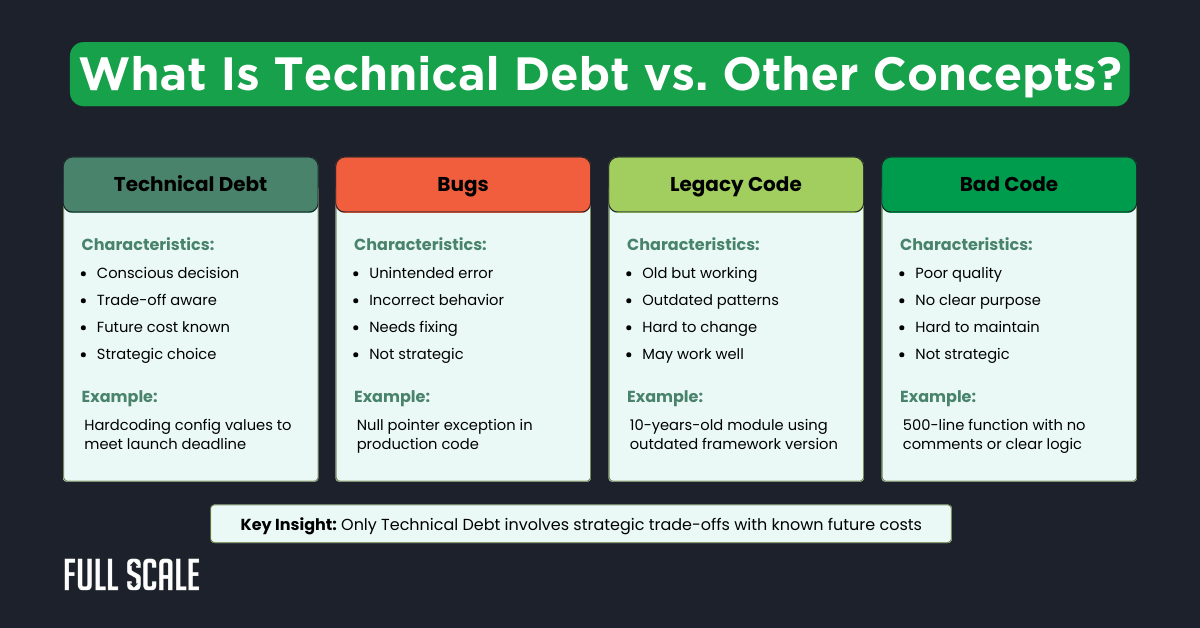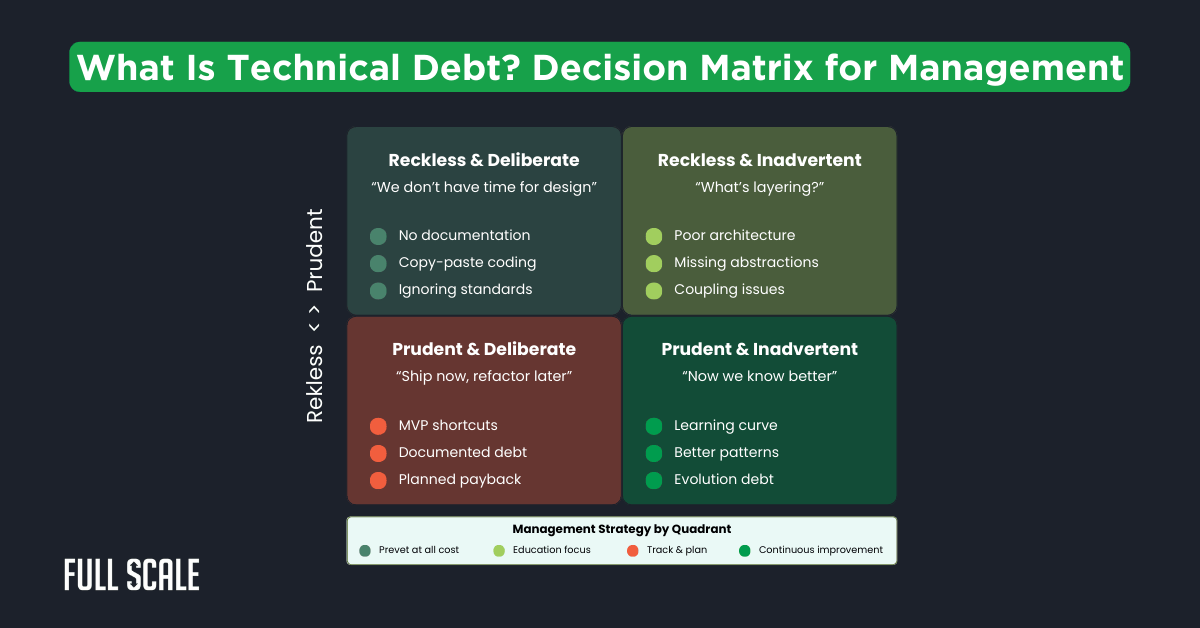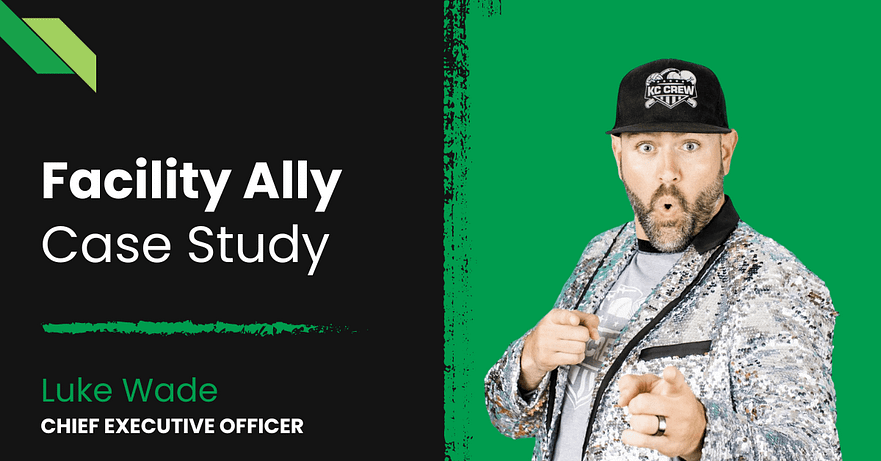What Is Technical Debt? A Complete Guide for Software Teams
What is technical debt? It’s the hidden cost that’s slowing down software teams worldwide. Recent studies reveal alarming statistics about the impact of technical debt on the industry:
- 23-42% of development time wasted managing technical debt (Stripe Developer Report, 2024)
- 87% of CTOs cite technical debt as their top impediment to innovation (McKinsey Tech Debt Study, 2024)
- $2.41 trillion annual cost to US companies from technical debt (Consortium for Information & Software Quality, 2022)
At Full Scale, we’ve helped over 200 companies identify and manage their technical debt effectively. This comprehensive guide explains what technical debt means for your organization and provides proven strategies for reduction.
Quick Answer: What Is Technical Debt?
Technical debt is the accumulated cost of shortcuts in software development. It includes quick fixes, outdated code, and architectural compromises that slow future development. Companies spend nearly a quarter of their development resources managing this invisible burden.
Understanding Technical Debt: The Real Definition
What is technical debt in its truest form? It represents the future cost of today’s development decisions. Ward Cunningham introduced this concept in 1992 to explain code quality trade-offs. Every shortcut taken today requires more work tomorrow.
Technical Debt vs. Related Concepts
Understanding what technical debt is requires distinguishing it from similar concepts:
- Technical debt differs from bugs – Bugs are mistakes, while technical debt involves conscious trade-offs
- Legacy code becomes technical debt – Only when it actively blocks new development
- Bad code isn’t always technical debt – Poor craftsmanship without strategic purpose is just bad code

Types of Technical Debt (With Real Examples)
Full Scale’s assessment framework identifies five main categories of technical debt. Each type requires different management strategies and impacts development differently.
Technical Debt Types & ImpactCode Debt
Example: Authentication logic duplicated across 15 microservices
Architecture Debt
Example: Database queries embedded in UI components
Infrastructure Debt
Example: 4-hour manual deployment process
Documentation Debt
Example: New developers need 3 months to become productive
Test Debt
Example: 2-week manual regression cycle before releases
Based on 10-developer team at $150k average salary
Click each card to see detailed metrics
Code Debt
Code debt appears when developers duplicate logic or use shortcuts. Full Scale frequently encounters authentication code copied across multiple services. This duplication increases bug rates by 40% and wastes 3 hours weekly per developer.
Architecture Debt
Poor architectural decisions create the most expensive technical debt. Database queries in presentation layers prevent scaling beyond 10,000 users. Full Scale helps companies refactor these issues before they block growth.
Infrastructure Debt
Manual deployment processes and outdated pipelines slow releases significantly. Companies with infrastructure debt deploy weekly instead of daily. This reduces market responsiveness and increases deployment failures by 15%.
Documentation Debt
Missing or outdated documentation extends onboarding from 4 weeks to 12 weeks. Full Scale measures documentation debt through new developer productivity metrics. Poor documentation creates knowledge silos that risk project continuity.
Test Debt
Low test coverage forces manual testing cycles that delay releases. Companies with under 40% test coverage experience 25% more production bugs. Full Scale implements automated testing to reduce 2-week regression cycles to 2 hours.
How Technical Debt Impacts Your Business
What is technical debt’s real cost to your organization? Full Scale’s data from 200+ client engagements reveals consistent patterns across industries.
Development Velocity Impact
- Feature delivery slows from 3 days to 3 weeks in debt-heavy codebases
- 40% productivity loss when technical debt exceeds critical thresholds
- 3x longer estimates become standard for new features
- Sprint commitments are missed 60% more often with high debt
What Is Technical Debt Costing Your Team?
Calculate your technical debt impact on development velocity
Ready to Reduce Your Technical Debt?
Full Scale helps companies reduce technical debt by up to 70% in 6 months
Get Free AssessmentFinancial Impact
Understanding what technical debt costs financially helps justify reduction efforts:
- $600,000 annual loss for a 10-developer team at 40% debt
- Equivalent to 4 senior developers’ worth of lost productivity
- 20-30% cost reduction after addressing critical debt
- 5x ROI on technical debt reduction investments
Team Impact
Technical debt significantly affects developer satisfaction and retention:
- 62% of developers cite technical debt as top frustration
- 2.5x higher turnover in high-debt environments
- Senior developers reject offers after discovering debt levels
- 3-month longer hiring cycles due to reputation issues
Product Impact
What is technical debt’s effect on competitive advantage? The data is clear:
- Competitors ship features 3x faster with modern architectures
- 25% higher customer churn when debt exceeds 60%
- Product roadmap delays become standard
- Market opportunities missed due to slow delivery
Identifying Technical Debt in Your Codebase
Full Scale uses quantitative and qualitative metrics to assess technical debt. Our assessment framework provides actionable insights for prioritizing debt reduction efforts.
Quantitative Indicators
Understanding what technical debt looks like in metrics helps teams identify problems early. Full Scale tracks these key indicators across all client codebases. Teams exceeding these thresholds require immediate intervention.
Technical Debt MetricsTechnical Debt Health Metrics
| Metric | Healthy Range | Debt Indicator | Action Required |
|---|---|---|---|
| Cyclomatic ComplexityCritical | < 10 | > 15 | Refactor complex methods |
| Code Duplication | < 3% | > 5% | Extract shared libraries |
| Test CoverageCritical | > 80% | < 60% | Implement test automation |
| Build Time | < 10 min | > 30 min | Optimize build pipeline |
| Deploy Frequency | Daily | Weekly or less | Automate deployment |
| Bug Escape Rate | < 5% | > 15% | Improve testing process |
| Feature Lead TimeNew | < 1 week | > 3 weeks | Address architecture debt |
| Code Review TimeNew | < 2 hours | > 4 hours | Simplify code structure |
Qualitative Signs
What is technical debt telling you through team behavior? Watch for these warning signs:
- “We can’t touch that code” – indicates architectural problems
- “Only John knows how that works” – reveals documentation debt
- “We’ll refactor it later” – shows accumulating shortcuts
- Workarounds becoming permanent – signals growing debt
Business Symptoms
Business metrics often reveal what technical debt is costing before code metrics:
- Missed deadlines becoming routine indicates underlying issues
- Features taking 2-3x estimates suggest architectural constraints
- Customer complaints are increasing due to technical debt
- Competitive disadvantage growing, showing velocity problems
Managing Technical Debt: Practical Strategies
Full Scale’s proven framework helps companies manage technical debt systematically. Understanding what technical debt management looks like in practice enables sustainable development.
The Technical Debt Quadrant
Making informed decisions about technical debt requires understanding its nature. Full Scale uses this quadrant to classify debt types and determine appropriate responses. Each quadrant demands different management strategies for optimal results.

Management strategies by quadrant:
- Reckless & Deliberate: Prevent through code reviews and standards
- Prudent & Deliberate: Track in backlog with a clear payback timeline
- Reckless & Inadvertent: Address through training and mentorship
- Prudent & Inadvertent: Accept as learning cost, refactor when touching
Prioritization Framework
Full Scale prioritizes what technical debt to address first using:
- Impact assessment – frequency of code changes and dependent systems
- Effort estimation – refactoring complexity and testing requirements
- Business criticality – features blocked by the debt
- Risk evaluation – potential for system failures
Management Strategies
The 20% Rule: Allocate 20% of each sprint to technical debt reduction. This prevents accumulation while maintaining feature delivery momentum.
Tech Debt Sprints: Dedicate full sprints quarterly for major refactoring efforts. Teams report a 30% velocity improvement after debt sprints.
Boy Scout Rule: Leave code better than you found it during feature work. Small improvements prevent debt accumulation naturally.
Refactoring During Features: Address technical debt in touched areas. Features built on refactored code have 50% fewer bugs.
Preventing Future Technical Debt
Understanding what technical debt prevention looks like saves significant future costs. Full Scale implements these practices across all client engagements.
Development Practices
- Code reviews focused on maintainability, catching debt before merging
- Pair programming on complex features prevents architectural mistakes
- Automated testing requirements ensure code remains maintainable
- Documentation standards prevent knowledge silos
Architectural Decisions
- Modular design principles enable easier maintenance
- Clear service boundaries reduce coupling between systems
- Technology standardization reduces complexity
- Regular architecture reviews catch problems early
Team Culture
- Celebrate refactoring wins to encourage ongoing improvement
- Make debt visible in sprint planning and backlogs
- Continuous learning about best practices
- Shared ownership of code quality
Making the Business Case
Different stakeholders need to understand what technical debt means for their priorities. Full Scale tailors communication to each audience effectively.
For CTOs
- Present velocity improvements show 40% productivity gains
- Demonstrate faster scaling capabilities post-refactoring
- Show competitor analysis and market advantages
- Provide detailed technical assessments with ROI
For Product Managers
- Focus on predictable feature delivery timelines
- Show how refactoring enables the product roadmap
- Demonstrate reduced bug rates and customer satisfaction
- Create integrated roadmaps showing the debt reduction value
For CFOs
- Calculate ROI showing 5x return on investment
- Present cost savings from reduced maintenance
- Show the risk mitigation value of stable systems
- Provide financial models with payback periods
For HR Directors
- Present developer satisfaction improvements
- Show how modern codebases attract talent
- Demonstrate retention improvements and cost savings
- Measure team morale improvements
Key Takeaways
Understanding what technical debt is and how to manage it transforms software development:
- Technical debt is inevitable, but it is manageable with proper practices
- Not all debt is bad when chosen strategically for market advantage
- Measurement is crucial – you can’t manage what you don’t measure
- Prevention costs less than fixing accumulated technical debt
- Business alignment ensures appropriate investment in the reduction
Next Steps
Taking action on technical debt requires both immediate and long-term commitment. Full Scale’s structured approach helps teams progress from assessment to resolution. These steps provide a clear path forward for any organization.
Immediate Actions (This Week)
- Run static analysis tools on your codebase
- Survey developers about the top three pain points
- Document known technical debt in your backlog
Short-term (This Month)
- Implement a technical debt tracking process
- Allocate 20% sprint time for debt reduction
- Create a visibility dashboard for stakeholders
Long-term (This Quarter)
- Establish a formal debt management process
- Set technical debt reduction OKRs
- Build refactoring into a product roadmap
Bottom Line: Full Scale’s Software Development Expertise
What is technical debt costing your organization? Understanding and managing it strategically is crucial for sustainable software development. Full Scale’s proven approach helps companies reduce technical debt while maintaining feature delivery.
Full Scale provides expert software development teams who:
- Build scalable systems while preventing technical debt accumulation
- Apply proven debt management strategies from 200+ successful engagements
- Include specialized developers, QA engineers, and technical leaders
- Implement best practices that reduce future maintenance costs
- Help teams achieve 40% productivity improvements through debt reduction
Our technical debt services include:
- Free codebase assessment and debt analysis
- Custom reduction roadmaps aligned with your business goals
- Dedicated teams for refactoring and modernization
- Ongoing monitoring and prevention strategies
- Training for your existing teams on best practices
Ready to assess your technical debt? Contact Full Scale for a free consultation. Start reducing technical debt today to accelerate development tomorrow.
Consult Us on How to Reduce Technical Debt
FAQs: What is Technical Debt
What is technical debt in simple terms?
Technical debt is like taking a shortcut when building software. Just as financial debt requires interest payments, these shortcuts require extra work later. For example, copying code instead of creating reusable components saves time initially but causes problems when updates are needed.
What is technical debt vs regular bugs?
Technical debt involves conscious decisions to prioritize speed over quality. Bugs are unintended errors that need fixing. A bug might crash your application, while technical debt might make adding new features take three times longer. Both impact development, but technical debt is strategic, while bugs are accidental.
Is technical debt always bad?
Not all technical debt is harmful. Strategic technical debt, like building a simple MVP to test market fit, can be valuable. The key is tracking and paying it back before interest accumulates. Full Scale helps companies distinguish beneficial strategic debt from harmful, reckless debt.
What causes technical debt in software projects?
Common causes include tight deadlines, changing requirements, and lack of experience. Teams create technical debt by skipping documentation, avoiding refactoring, or choosing quick fixes. Full Scale identifies root causes in your development process to prevent future accumulation.
How do you measure technical debt?
Measure technical debt through code metrics like complexity and duplication, plus business metrics like velocity decline. Full Scale uses automated tools to track technical indicators and surveys to capture team pain points. Combining quantitative and qualitative measures provides complete visibility.
What is technical debt costing my company?
Technical debt typically costs 23-42% of developer time according to industry studies. For a 10-person team earning $150k on average, that’s $345,000-$630,000 annually. Use our calculator above to estimate your specific costs based on team size and debt level.



